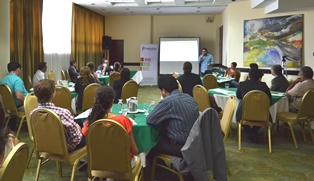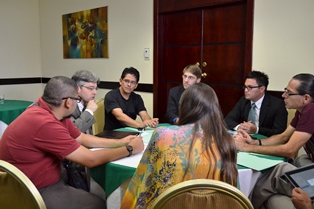
 Given that clean energy has become such an important national and international issue in recent years, Yo Emprendedor created a specific category for these types of ventures, to encourage entrepreneurial activity in this sector in Central America and the Caribbean. The nonprofit, nongovernmental organization, which is based in Costa Rica, implemented the effort under ECPA auspices, with support from the U.S. Embassy in that country as well as local and regional stakeholders.
Given that clean energy has become such an important national and international issue in recent years, Yo Emprendedor created a specific category for these types of ventures, to encourage entrepreneurial activity in this sector in Central America and the Caribbean. The nonprofit, nongovernmental organization, which is based in Costa Rica, implemented the effort under ECPA auspices, with support from the U.S. Embassy in that country as well as local and regional stakeholders.
The main goals included identifying, highlighting, and empowering clean-energy entrepreneurs and projects that are innovative and have a high growth potential; activating a dialogue with policymakers to promote a regulatory framework favorable for clean energy; and encouraging greater coordination among institutions and closer ties among entrepreneurs and other key players. To meet these goals, the program organized a series of activities, including a business plan competition, workshops, and webinars, and created a virtual ecosystem for entrepreneurs involved in clean energy.
 The project included the participation of both entrepreneurs and representatives of public and private institutions that support entrepreneurship. Yo Emprendedor stressed the high level of clean-energy innovation in the region—evidenced in the quality of the projects that participated in the business plan competition and in a global competition sponsored by Cleantech Open—and said the ECPA initiative had laid the groundwork for continuing to promote entrepreneurship in this field to ensure a long-term impact.
The project included the participation of both entrepreneurs and representatives of public and private institutions that support entrepreneurship. Yo Emprendedor stressed the high level of clean-energy innovation in the region—evidenced in the quality of the projects that participated in the business plan competition and in a global competition sponsored by Cleantech Open—and said the ECPA initiative had laid the groundwork for continuing to promote entrepreneurship in this field to ensure a long-term impact.
The ECPA initiative also identified challenges and obstacles faced by green entrepreneurs in the region. These include a lack of access to information on business incubators and networks that could support entrepreneurship efforts. A lack of institutional coordination is another problem that leads to a duplication of efforts and causes entrepreneurs to lose critical opportunities. Other challenges for clean-energy entrepreneurs include the regulation of generation rates, the time required to process permits and concessions, and the need to develop adequate funding sources and provide incentives for both investors and entrepreneurs.
 View Map
View Map